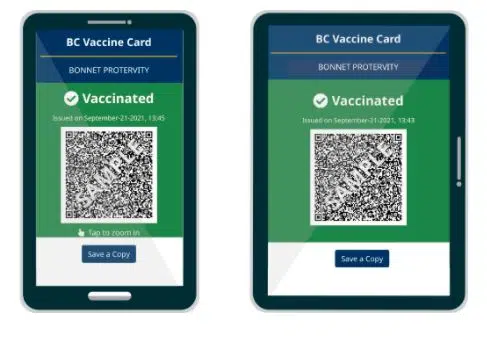
The BC Vaccine Card. (Photo via BC Government)
B.C. is moving ahead with its plans to end the use of the COVID-19 vaccine passport as of this Friday.
However, don’t delete it off your phones just yet, as individual businesses and organizations can choose to continue requiring the use of the vaccine passport, if they want to.
Provincial Health Officer, Dr. Bonnie Henry says, as of 12:01 a.m. on April 8, businesses will also need to transition from COVID-19 safety plan to communicable disease plan.
That is also when the vaccine requirement to stay in on-campus housing at post secondary institutions will be lifted.
“Where we are today should be no surprise to people. We’re in a reasonably good place,” Henry said. “Transmission, hospitalizations and deaths are all down, this is encouraging.”
The province is also moving from daily to weekly reporting of COVID-19 data as of this Thursday, April 7.
People are still being encouraged to get vaccinated and boosted if they aren’t already and to keep wearing masks if they want, though it hasn’t been mandatory for the past four weeks.
Health officials also say they will continue to monitor the situation through an expansion of wastewater sampling as well as ongoing monitoring of visits to healthcare and long term care facilities.
As of Monday, April 4, the province says there are 321 people in hospital with COVID-19, with 36 of those people in the ICU.
They also say 90.9 per cent of eligible people over the age of five have gotten one dose of a vaccine, with 87.4 per cent of people with two doses. A further 57.7 per cent of people over the age of 12 have gotten a booster dose.
Fourth Dose of Vaccine Coming to Vulnerable People
B.C. has also begun rolling out a spring booster vaccine to seniors in long-term care and assisted living facilities.
This booster will also be offered to people over the age of 70 in the community, Indigenous people over the age of 55, and those considered to be extremely clinically vulnerable.
People will be able to get this new dose at pharmacies six months after their third dose.
“More and more data shows us that the booster dose at all ages decreases transmission,” Henry said. “It doesn’t eliminate it completely but even with Omicron, even with the BA.2, it reduces that risk of infection across the board and provides us as we’ve noted very strong protection against hospitalization, ICU, and death.”
As of this moment, there is no plan to get these second booster doses to younger people as health officials say they tend not to get as ill with COVID-19.
“Thanks to the many British Columbians who have stayed up to date on their COVID-19 vaccines, we are seeing high levels of immunity and protection in our communities,” added Health Minister Adrian Dix.
“Boosters are an important part of continuing to protect those who are most at risk as restrictions continue to be lifted, and I encourage everyone to make time in their day to get a booster dose.”















